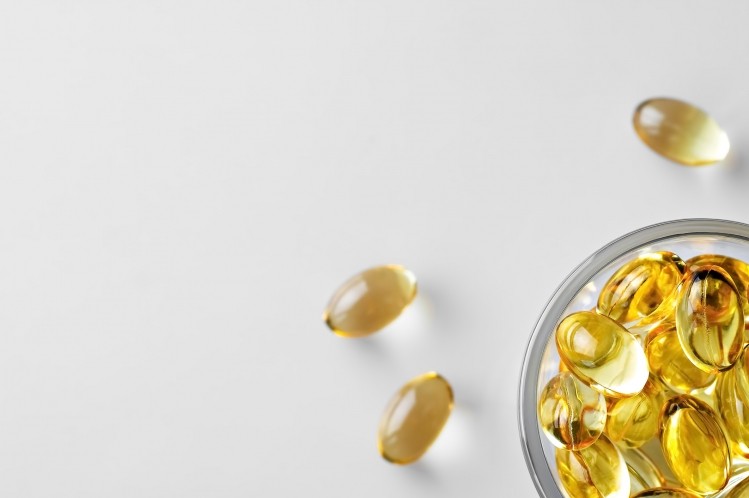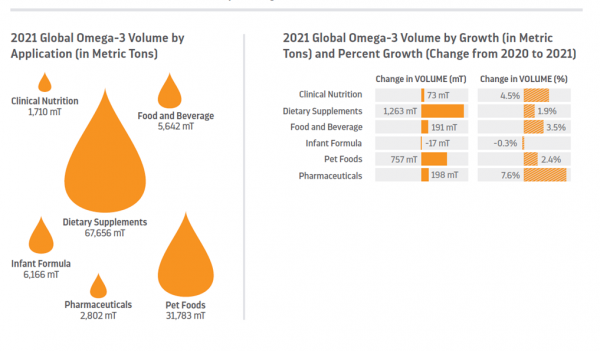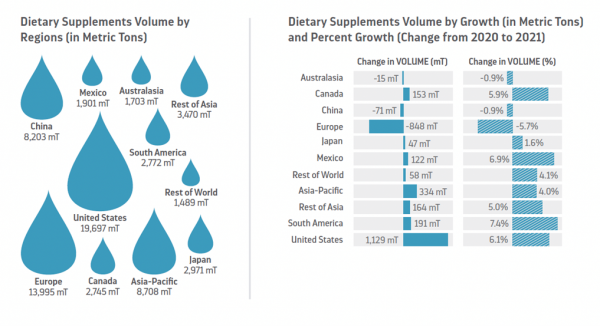Guest Article: Issues and challenges for omega-3s in 2022

Overall, the EPA and DHA omega-3 market globally was a $1.58bn market in 2021 (the last year for which data are available), with volume at 115,758 metric tons. Dietary supplements made up the largest share of the market, accounting for 58% of the volume at 67,000 metric tons.
Within supplements, the US market, which grew 4% in 2021, continues to be the largest market. Demand remained strong in 2021 and into 2022, with algae oil products gaining ground due to increased consumer interest and more capacity of algal oils coming onstream. (See figures below)
Across the industry, supply chain challenges continued to be a concern, although by the end of the year, reports were that the situation had eased somewhat, with consumers spending more on travel and entertainment rather than material goods (alleviating some shipping pressures).
Inflation was of course another common topic, with the war in Russia/Ukraine and China’s ongoing zero Covid policy and the resulting disruptions exacerbating an already tough macro-economic situation. The good news is that typically in a recession, supplements fare well as consumers focus more on prevention and self-care and, in past economic downturns, omega-3s have maintained a good position.
The other variable for omega-3s, however, is very high fish oil prices, which are expected to appear in price increases at the consumer level by the end of this year or early next year. It remains to be determined whether this will cause consumers to leave the category (temporarily), trade “down” to a store brand or private label offering, or double down on keeping themselves healthy.
The second anchovy fishing season in Peru — which supplies the majority of oil used in omega-3 supplements — is currently underway, and while the allowable quota is acceptable, early harvest reports are that the EPA and DHA content in the anchovy is low. If this remains the case, supply challenges and high prices will continue in 2023.
Technical and Regulatory Topics
On the regulatory front, the main issue impacting the US market in 2022 was the suspension of US exports of encapsulated fish oil products this past spring by the National Oceanic and Atmospheric Administration (NOAA)’s Seafood Inspection Program (SIP).
The issue was concern for the integrity of the seafood certification process as a whole rather than a safety concern about fish oil. In part through GOED’s intervention, the proposed suspension deadline was delayed in order for SIP to work with industry to clarify the situation and in September, SIP provided additional details on how the approval process would work.
As we go to press there are still issues being experienced by GOED members but the situation is headed in the right direction, including all regional offices issuing export certificates for fish oil-based composite products (i.e. fish oil + plant-based ingredient).
The other NOAA-related issue this year was the ongoing questions regarding the Fish and Fish Product Provisions of the Marine Mammal Protection Act, which requires any global fishery exporting to the US to comply with rules to address mortality and injury of marine mammals in fisheries that export fish and fish products to the United States. [Editor’s Note: For more information on this, please see Ellen’s article from 2021].
The paperwork from fisheries was due in 2021 and NOAA was supposed to issue what are called “comparability findings” — regarding whether the fishery is cleared to export to the US — this year. However, last month NOAA announced a one-year extension of this documentation until 31 December 2023.
The technology topic du jour is mineral oil hydrocarbons or MOH. While this is more of a focus in Europe as the industry awaits impending regulations on these contaminants, the issue has the potential to impact the global omega-3 business as European regulations tend to eventually move to other geographies. Of particular concern is a contaminant known as MOAH (mineral oil aromatic hydrocarbon), which is potentially carcinogenic and is possibly found in soft gels (including omega-3s, vitamin D, etc.).
The situation is further challenged by the lack of sophistication of test methods to detect MOAH and the lack of understanding about the issue from manufacturers. GOED has been working with omega-3 producers and testing companies to gather data and better understand the situation in order to provide informed comments to the European regulatory bodies.
Global Omega-3 Day a Growing Focus
It’s also worth mentioning that GOED promoted Global Omega-3 Day on March 3 (03-03) and plans to do so in an even bigger way in 2023. Created to shine a spotlight on the benefits of EPA and DHA, the special day in 2022 included social media posts from around the world as well as specials and discounts from omega-3 brands.
The goal for 2023 is to grow awareness of the day with more point of purchase activations, social media promotions and in-person outreach.











